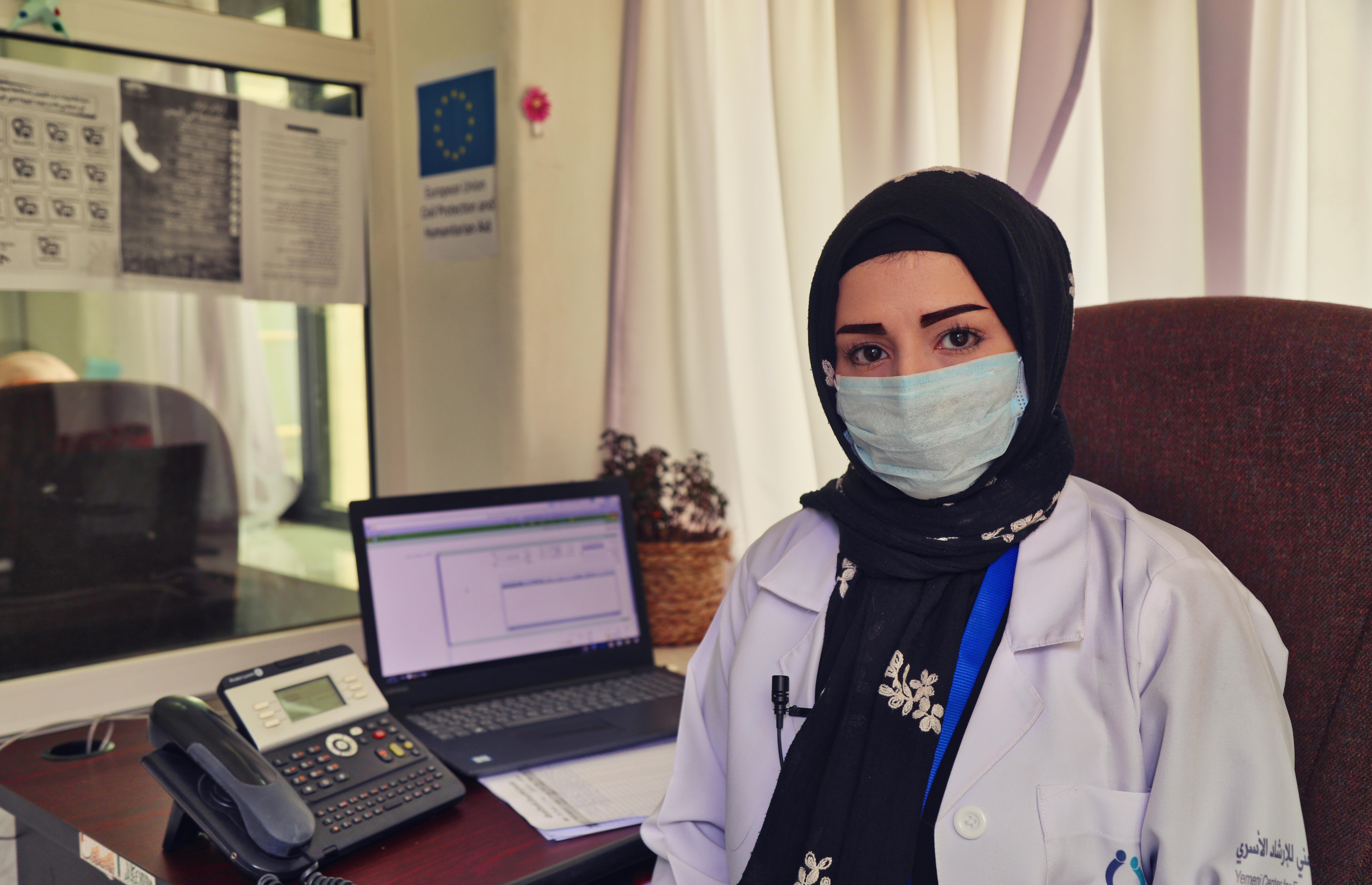SANA’A, Yemen – Years of war, poverty and gender-based violence have taken a serious toll on the mental health of many women and girls in Yemen. Now, the COVID-19 pandemic and related economic hardships have only aggravated their situation.
Marwa* has experienced these stresses first-hand.
After her parents divorced, when she was only 9 years old, Marwa took over caring for her younger siblings. On top of this burden, her unstable father began to abuse her, beating her severely and refusing to allow her to attend school. Recently, he forced her to marry an older man. She is only 16.
“Marwa called our family counselling hotline in a miserable condition only two weeks after her wedding,” described Ishraq, a psychologist at a UNFPA-supported mental health call centre in Sana’a, the capital.
After the wedding, Marwa had difficulty eating and sleeping. She was overwhelmed with worry for her younger siblings, fears about the COVID-19 pandemic and anxiety over the escalating conflict.
Needs growing
An estimated one in five people in Yemen suffer from mental health disorders, according to a 2017 study conducted by the Family Counselling and Development Foundation. This number could be even higher now, thanks to the pandemic and continuing toll of the conflict.
More than 2,000 cases of the virus have been confirmed in Yemen, according to the World Health Organization. Since COVID-19 reached the country, Ishraq’s phone at the mental health hotline rings more than ever.
Still, mental health care is scarce in Yemen. Mental illness is highly stigmatized, and the proportion of psychiatrists per population is small. Some of the few existing mental health services have even closed due to the pandemic.
“I receive about 15 to 20 calls per day from people requiring psychological support and assistance,” Ishraq explained. “Our telephone services aim mostly to serve people living in remote areas who find it hard to travel for direct treatment, or face economic hardships, are not being allowed to seek treatment by their families, or fear being stigmatized if identified.”
She says the pandemic has exacerbated poverty and violence. This, in turn, is increasing the need for mental health support.
“With the spread of COVID-19, many people have lost their jobs and added to the burdens they are already facing as a result of the conflict… Many families have disintegrated and violence is spreading,” she said. “We now not only receive calls from remote areas, but from people with higher positions in society, including doctors, university doctors, master’s students and many others.”
UNFPA has long provided psychosocial support to survivors of gender-based violence.
Initially these services were provided by social workers, and in 2018 UNFPA began to provide counselling through psychological support centres as well. These centres provide specialized and clinical mental health care, including through telephone assistance. Six UNFPA-supported psychological support centres are currently operational, two of which are supported by European Union Civil Protection and Humanitarian Aid.
In response to the increasing demand for these services, UNFPA has increased the number of counsellors, like Ishraq, who are available to provide telecounselling services through 18 toll-free telecounselling hotlines, established to assist survivors of gender-based violence and provide information on COVID-19 prevention.
Nearly 18,000 people have received specialized psychological support through the toll-free hotline since 2018, and more than 25,000 survivors of violence have had psychological support through in-person counselling.
Help for the whole family
Marwa’s cry for help worked – not only for herself, but for her family too.
“After diagnosing Marwa’s condition, we found that the solution revolved around treating her and in providing psychological support to her father,” Ishraq said. With Marwa’s consent, counsellors were able to secure psychiatric treatment for her father, who was experiencing paranoia and delusions.
The counsellors also supported Marwa and helped build her self-esteem. “I made it clear to her that she was a strong girl, having taken care of her sisters, herself and her father after her mother's departure, and I made her see her achievements in her life,” Ishraq said.
In all, Marwa received more than a dozen telephone therapy sessions, which focused on developing problem-solving skills and other tools for mental wellness.
Services under threat
But these services are under threat when they are most needed.
Funding for these essential humanitarian services is running dry. Fifty per cent of UNFPA’s programmes addressing gender-based violence will be suspended by the end of September. Specialized services for survivors in 29 safe spaces in 21 governorates and four specialized psychological centres in Aden, Sana’a and Hadramout governorates will close if funding is not mobilized.
This will leave an estimated 350,000 people without gender-based violence response services, and 40,000 highly vulnerable people will lose access to psychological care.
“My only wish is for this service to continue to grow and expand,” Ishraq said. “Cases are increasing daily.”
* Name changed for privacy and protection


